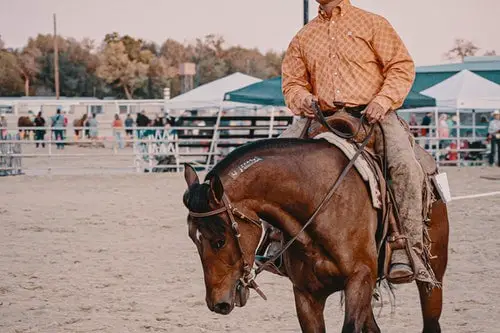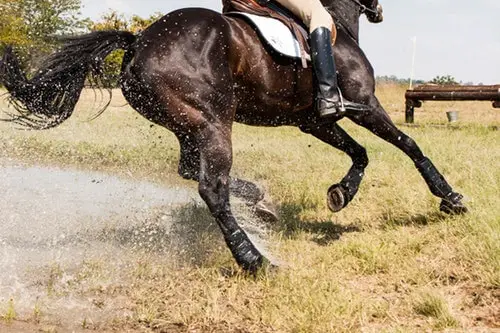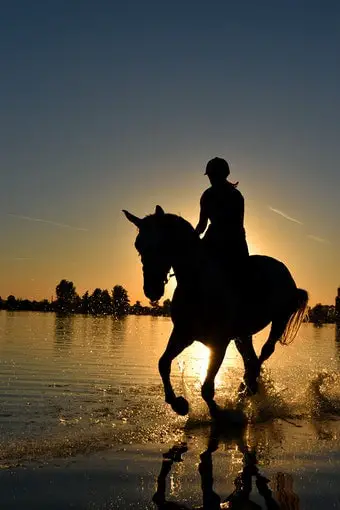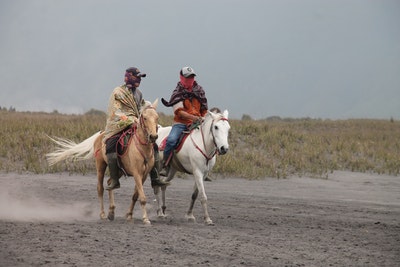When people ask the question – Is horse riding good for the horse? It is often met with contrary opinions. While some persons believe that horse riding is beneficial to the animal, others are of the opinion that horses are simply used for pleasure and they can get hurt in the process by riders.
Some persons take things a step further by questioning if horses enjoy the sporting activity. Both ends of the spectrum hold highly contrasting opinions. Horse riding is an activity in existence for decades.
Equestrians consider it a sport and rightly so because to this day we have horse racing events or competition and professional riders who involve in these activities. There are rules and veterinarians in place to ensure these horses are in a healthy condition during any riding event, but this isn’t enough for those who feel the horses are being used.
Some persons argue that horses are wild animals, so they should be allowed to mingle freely with other wildlife. Others liken them to domesticated animals like dogs. While domestication might not be a welcome concept to some, it is difficult to deny the fact domestication of animals has helped preserve some species and that can be said for horses.
Modern Horses
Horses have been domesticated by humans for centuries. The modern horse is pretty much a domestic animal like the pets you keep at home. Just like a dog has different breeds, there are also various horse breeds. The majority of these horse breeds can’t be regarded as wild horses as they’ve spent years cohabiting with humans.

There are a few species of horses that have never been domesticated; these can be referred to as ‘wild‘. Wild horses aren’t really in existence. Animals are domesticated by humans for a purpose. Take dogs, for instance, they evolved from wolves; dogs have cohabited with men for years as well. Man provides them with food, shelter, and care, in return, the animal served as a hunting companion.
Hundreds of years after, we have the ‘domestic dog‘.
The same thing happened to horses. Humans provided them with shelter and food and used the horses as a means of transportation even during wars, I’m sure you can remember those ancient movie scenes. The process of domestication is way more than just taming an unruly animal.
It involves physiological change as a result of being breeding an animal in captivity. This is what birthed the domestic cat, dog, and in this case horse. A bull that lets you ride it is not a domestic animal, it has simply been tamed. However, breeding bulls in captivity for centuries will lead to the transfer of genes conditioned to this lifestyle forming a domestic bull. Hopefully, you get the analogy.
Horse riding is beneficial to modern horses. Riders can easily recognize the difference between horses ridden regularly and those who barely leave the stables. Imagine an inactive person who is always curled up on the couch eating or sleeping and one who is physically active. The spines of horses have also evolved to carry riders provided they aren’t too large.

Yes, bad riders might cause discomfort to the horse, but the animal will reveal its pain with a rear, buck, and jerk or by simply refusing to cooperate. However, a good rider knows how to direct the horse. This is why taking riding lessons from an experienced rider or trainer is important. That way, you learn the best way to treat and lead a horse.
The way you treat your horse generally helps you develop a solid partnership as your horse will learn to trust you. This principle also applies to horses used for competition, skilful riders who have earned the trust of their riding companion are able to work well with the horses and perform excellently.
Summarily, riding is helpful to the health and well-being of the modern horse provided it is well catered for and not overworked.
Concerns about Horseriding
On the other extreme, some feel horse riding is just another form of animal cruelty. They ask questions in the likes of “do horses also find pleasure in riding activities?”
Although there are ethical rules or laws currently regulating the use of animals, including horses. Some persons feel the rules need to be more sophisticated with the sole objective being the welfare and mental health of the animal.
Horses generate billions of dollars a year from racing competitions, gambling, and other riding activities. These activities event involve trail riding, endurance riding, racing, show jumping, reining and so all. Horse riding is an activity geared toward human pleasure and entertainment.
The only benefits horses get as domesticated animals include, food, shelter, protection from predators, and health care when sick or injured. Apart from the previously mentioned, horses do not have much to gain.

While it isn’t bad to do something simply for pleasure, some people are bothered because they do not feel the horse enjoys being ridden as much as the rider loves to ride and if there is a possibility that the horse hates the experience, why bother indulging in the act at all?
There are also worse case scenarios where horses were seriously injured or died in an even like jump racing. These occurrences are a major cause of concern for many. It further strengthens their belief that the welfare of horses is not put in utmost consideration and anything goes as far as humans are being entertained.
With a large population of horse owners in places like Australia, there should be strict rules put in place to control horse ownership, training, experience, and the welfare of these animals.
Activities which show animal cruelty should be avoided, they include –
- Use of tacks that will cause pain or discomfort such as cranked nosebands, lever bits, and double bridles.
- Practicing riding techniques that permit punishment or rough control of the horse
- Use of whips or spurs
- Inadequate care; not feeding or watering them properly
- Extremely challenging competitions
- Overworking the animal
These actions affect the horses’ mental state and most of them are peculiar to the more extreme activities like the dressage sport where they use double bridles and spurs. The rules in place do not put a restriction on deep riding or the use of tight nosebands. Hence, these activities are allowed.

As riders or managers of horses, it is your primary responsibility to ensure your horse is well catered for both physically and mentally. You should be able to decide which action is necessary or totally stressful for the animal. Ultimately, your concern should be centered on your horses’ welfare.
Conclusion
The act of horse riding is apparently met with different opinions and concerns. While some believe that horse riding is beneficial to the modern horse, others argue that riding activities are primarily centered on human pleasure and horses might not enjoy the activity.
In addition, there are extreme forms of riding events that stress the animal and threatens its health. The benefits of domestication the horses enjoy came with a tradeoff. Horses have been bred with humans for centuries and this has contributed greatly to the preservation of their species. However, this does not excuse animal cruelty. Activities were known to cause the animal stress, pain or any form of discomfort should be avoided.

